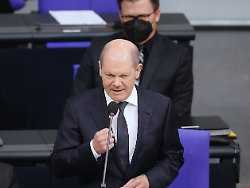Chancellor questioned in the Bundestag
Scholz accuses Russian soldiers of “massacre” in Bucha
By Sebastian Huld
04/06/2022, 3:18 p.m
The Federal Chancellor answers the questions of the MPs and, as expected, they revolve around the war in Ukraine. Olaf Scholz has little new to report on this, but once again demonstrates the determination of the federal government.
The first words before his questioning are due to the Chancellor, and Olaf Scholz immediately speaks in the Bundestag about what is by far the most important topic these days: the many civilians killed in the Kiev suburb of Bucha. “Russian soldiers massacred civilians there, including children, women and old people,” says Scholz, noting: “The murder of civilians is a war crime.” Unfortunately, the members of the Bundestag failed to ask whether this important statement by the German head of government was based on the findings of German and international media reporting from Ukraine, or whether the federal government also had its own information on this.
For the time being, the spiral of mutual accusations between Ukraine and its supporter states on the one hand and Russia and Putin supporters on the other hand remains. “The cynical assertion spread by Russia that this topic is a staging falls back on those who spread these lies,” says Scholz. Nevertheless, further evidence, if the federal government has its own, would have been good for the debate in Germany and internationally. On the other hand, the fact that nobody in the Bundestag, not even the AfD, is spreading the Russian narrative of a Ukrainian deception maneuver is at least something in these heated times.
Scholz: Refugees are welcome
Olaf Scholz does not receive any contradiction to his statement: “It must remain our goal that Russia does not win this war.” This includes the fact that no “dictated peace” should be imposed on Ukraine. He explained in talks with Russian President Vladimir Putin that only the Ukrainians can decide on possible concessions in negotiations with Russia. In addition, Scholz announced a quick agreement on financing the accommodation costs for Ukrainians who have fled to Germany. “I wish that we didn’t have a long, long discussion about financial issues between the different levels of our country,” says Scholz. He expects more refugees and these people are welcome.
In the rounds of questions, of course, only the MPs from the opposition factions expressed doubts about the Chancellor’s course. The AfD calls for the announced energy price cuts to be implemented more quickly, the CDU MPs for a more determined supply of weapons systems to Ukraine, and the left for social and labor market policies that focus on the needs of the weakest in society.
Paradigm shift or not?
Scholz assures the CDU politician Johann Wadepuhl that the federal government is doing “everything that is necessary and right” for the arms deliveries to Ukraine. Scholz argues with Wadepuhl and his parliamentary colleague Jürgen Hardt as to whether the federal government has carried out a paradigm shift with the arms deliveries. Wadepuhl points out that the grand coalition had already supplied weapons to the Kurdish Peshmerga in the fight against the Islamic State in 2014, after Scholz rejected the Union’s criticism of the slow delivery of arms, arguing, among other things, that the Union had previously refused arms deliveries to conflict zones.
Scholz replies to the AfD MPs that the relief package is on the way and that their demand for an extended use of German nuclear power plants is evidence of a lack of technical expertise. “If the world were as simple as you imagine in your question, then we would have a very good life,” said Scholz to AfD MP Marc Bernhard. His parliamentary colleague Gottfried Curio accuses Scholz of staging his own social media channels after Curio speaks of Germany’s decline. “It’s just not true what you say,” Scholz counters.
All in all, Scholz presents himself as usual: determined and without the slightest hint of doubt about his own assets, to cope with war and crises. The Easter package presented by Federal Minister of Economics Robert Habeck on Wednesday paved the way for an accelerated energy transition and the phase-out of fossil fuels. “Now more than ever we will make ourselves independent of the use of fossil resources,” says Scholz. “That is our task.”
